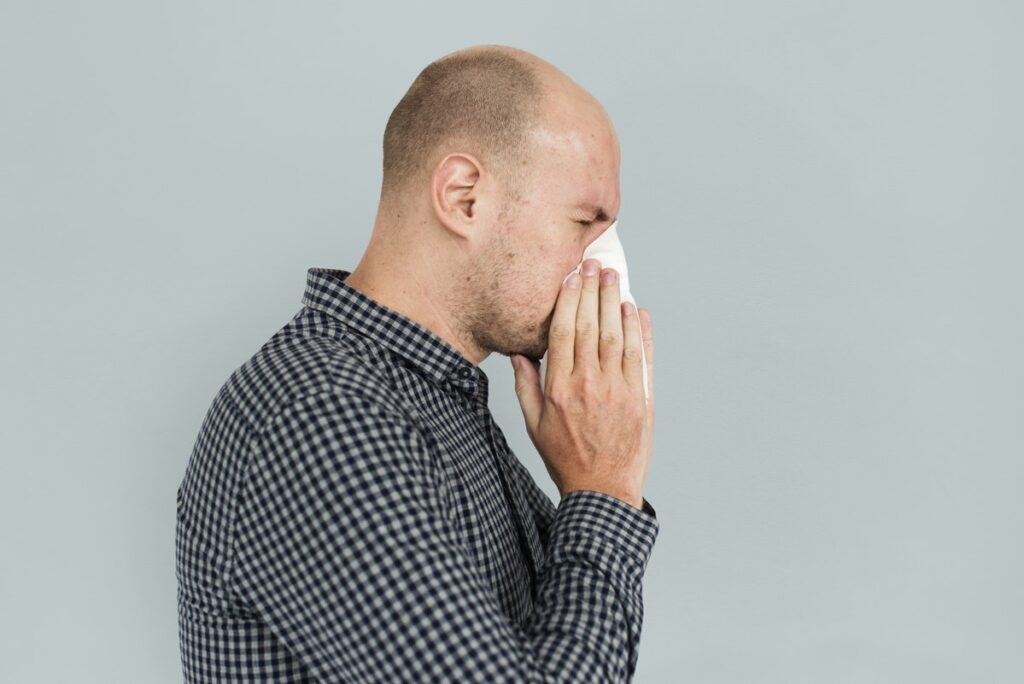
Most of us know that winter weather is not good for the nose. Lack of humidity, cold outside air, and indoor forced-air heating dehydrate the mucous membranes inside the nasal passages. That can leave you with dry nasal passages and sinuses, a stuffy feeling, crusty nose, and yes, even tough runny nose. What we all know as a dry nose.
Beyond relieving discomfort, addressing nasal dryness, rather than waiting for things to naturally improve when the weather warms up, is for your overall health.
Mucus is an important substance that the body produces to protect itself from foreign substances such as viruses and bacteria. It's quite sticky, which helps it trap foreign particles that can then be removed by the body, and it also has antimicrobial properties that fight infection.
Beyond cold, dry weather, other causes of a dry nose include smoking, vaping, and certain medications. Add that to a growing list of reasons to consider quitting and find the support you need. Now, you will want to know how to treat a dry nose and prevent that Sahara-like sensation in your nasal passages in the future.
Why is the nose dry?
A common cause of nasal dryness is blow your nose too often, either due to a cold or allergies. Dry nose is also common among people who live in areas with a dry climate and who smoke tobacco or marijuana. Chronic nasal dryness can also be caused by certain medical conditions, such as Sjogren's syndrome.
Other causes of nasal dryness include infections, nutritional deficiencies y rhinitis chronic atrophic, a long-standing nasal inflammation due to an unknown cause. It is also a common symptom of certain medications, such as antihistamines y decongestants used for common colds or allergies.
Apart from being uncomfortable and painful, it is rare for there to be serious cases. The lining of the nose and the fold below it are sensitive, and excess dryness and irritation can cause the skin to crack and bleed. However, if you have a dry nose for more than 10 days or experience signs of infection (fever, discharge, nosebleeds that won't stop, and weakness), you should see a doctor immediately.
Remedies to avoid dry nose
Try a saline solution
Saline nasal sprays and gels keep your nasal passages nice and moist. How often you'll need to use them will be different for everyone, but spray your nostrils as much as needed for comfort, which could be twice a day or every four to six hours.
If you find that you have to use nasal sprays all the time, try a gel, which tends to last longer. A saline gel is preferable to something like olive oil, coconut oil, almond oil, or Vaseline, which some people try applying to the nostril with a cotton swab.
This isn't really the way it should be used, and you don't want to inhale it into your lungs. Also remember to avoid inserting a swab more than a quarter inch into the nostril. Not recommended yet, but keep this in mind in case you try it anyway because you don't have anything else in the house at the time.

drink more often
Drinking water throughout the day is important to keep your whole body (including your nose) well hydrated, even in winter. Keep a water bottle handy and fill it up often.
Not sure how much water you should drink? A good rule of thumb is to drink about 3 liters a day.
stay moist
If you have a humidifier connected to your central air inside the house, check the humidity levels and increase it if necessary. Otherwise, portable humidifiers can also be useful for introducing necessary humidity to a room.
The ideal humidification is between 40 and 45 percent, 35 to 40 percent if the person has a mold allergy. Humidity levels in a heated home in the winter can be well below 20 percent, and often below 10 percent. It's like being in a barren desert. Even with a whole-house humidification system, it's a good idea to use a small humidifier in your bedroom to keep your nasal passages moist while you sleep.
If you are traveling, it is recommended to hang wet towels in the room as a remedy for a dry nose.
Take a look at your overall health
There are certain medical conditions that can make you more prone to the effects of a dry nose, including Sjogren's syndrome, a chronic autoimmune disease in which your body attacks its own glands that produce tears and saliva. This can lead to dry nasal passages.
If you notice other symptoms of Sjögren's disease, such as nosebleeds, frequent sinusitis, changes in smell or taste, or dry eyes (among others), talk to your doctor.

Check the medicines
If you suspect that a new medication may be causing dryness, make an appointment with your doctor, so they can review what you're taking and make changes if necessary.
It's also important to note that you could mistakenly attribute a dry nose to allergies and taking antihistamines. These can exacerbate dryness, so talk to your doctor before taking any over-the-counter allergy medication.
check you have blood
If you're also experiencing bleeding along with a dry nose (you can see it in bloody mucus and crusts), talk to your doctor. You may be prescribed an antibiotic nasal ointment, which will moisturize your nasal passages and help clear up any bacterial infections that may be occurring.